The risk of stillbirth is doubled if women go to sleep on their backs in the last trimester, a study finds.
Category Archives: Health Tips
Health24.com | How masturbating, breathing and 23 other simple habits can make you the healthiest you’ve ever been
You know the basics of what you need to do to help your health: Eat right, get moving and stop smoking.
Those are the majors, but as any guy who lifts to build muscle knows, the accessory work is pretty damn important, too.
Just like how you need to give your smaller muscles some love if you want to build a truly impressive physique, you have to pay attention to the little stuff if you want to become the healthiest man you can be.
The good news is, tons of these health accessory work is super easy to implement. The harder part? It can be difficult to know what you really need to focus on.
So we’ve taken the guesswork out of it for you. We picked the brains of 25 of the top doctors, nutritionists, sex therapists and other wellness experts out there to determine the single best thing you can do to help your health.
We’re not talking large, overarching life changes – these are the simple, small things you can get started on right now.
Take a read through the list and pick out the ones you want to try. Your body and mind will thank you.
1. Make time for masturbation
Take your health into your own hands. When your stress levels peak, masturbation can help you unwind, says relationship therapist Paul Hokemeyer, PhD. That’s because reaching orgasm will release a whole slew of feel-good hormones, like oxytocin and prolactin, which leave you with that calm, sleepy feeling you typically experience after climax.
“Too often we forget that our bodies are incredible machines that can provide us with all sorts of wonderful coping and performance mechanisms,” says Hokemeyer.
And while it works wonders for your mood, masturbating can also help prevent prostate cancer, the third leading cause of cancer death in men.
In fact, men between the ages of 20 to 29 who ejaculated 21 times or more each month are 19% less likely to be diagnosed with prostate cancer than those who ejaculated less often, according to research from Boston University.
Read more: 11 shocking facts you never knew about masturbation
2. Spot the ugly ducking on your skin
Melanoma isn’t the most common kind of skin cancer, but it’s responsible for the greatest number of deaths. You can increase your chances of beating the cancer by catching it early.
Normal moles can grow and change, but they usually do so symmetrically and very slowly over the course of years, says Dr Saira J George, an assistant professor of dermatology at the University of Texas MD Anderson Cancer Centre.
Any mole that is changing in size, shape or colour within weeks or months warrants special attention. But pay extra special attention if the mole in question is an “ugly duckling” that looks different from the rest of your other moles.
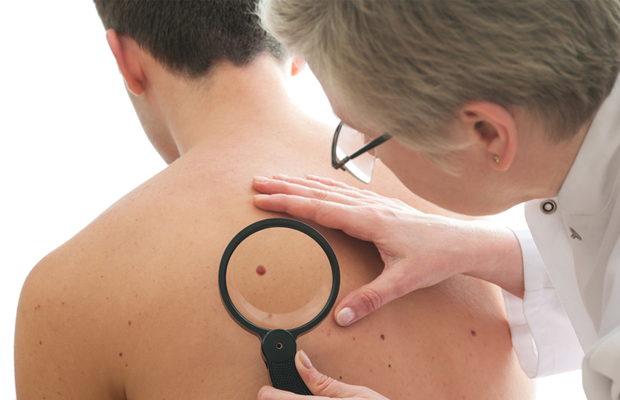
Read more: 5 cancers that kill men – and how to spot them before it’s too late
3. Mind your breath
“For the first 10 minutes of your next workout, commit to breathing solely through your nose,” suggests Nathan Helming, head coach and co-founder of The Run Experience.
“The reduced airway passage will force you to breathe more deeply to fully engage your diaphragm for more powerful and relaxed belly breathing. It works if you’re going on a run, taking a spin or even lifting weights on your own.”
After you practice this for the first time, you’ll quickly realise how often you tense up and hold your breath in your chest, neck and shoulders. This type of tension can actually lead to greater stress levels, poorer performance, and even side-stitches and cramps, explains Helming.
4. Perform a daily tick check
Do a tick check daily, paying extra close attention to anything below the belt that’s about the size and colour of a poppy seed, says Dr Thomas Mather, director of the TickEncounter Resource Centre at the University of Rhode Island.
That can be a nymph-stage tick, which can be loaded with disease-causing germs, like the bacteria that causes Tick Bike Fever. These ticks typically latch on at shoe level and crawl up, until they get “stuck” where underwear or skin folds restrict their further ascent.
So when you’re sitting on the throne each day, check your scrotum and penis for any spots that fit the bill. And if you do see one, remove it with a tweezers.
Despite what you may have heard about a lit match getting rid of the buggers, it’s never a good idea to touch a hot object to a tiny tick attached to your scrotum.
5. Check out your chest
Men can also get breast cancer – about 2 500 cases are diagnosed in the US this year alone, says Dr Sharon Giordano, chair of the department of health services research at the University of Texas MD Anderson Cancer Centre.
If you develop any symptoms like a lump under your nipple or bleeding from your nipple, head to your doctor for further evaluation, as these can be signs of breast cancer in guys.
Your doctor may order a mammogram, ultrasound or biopsy to check for cancer.
6. Have ‘The Talk’
Four out of every five men don’t talk to others about their sexual health – or any health issue, for that matter, a survey from Orlando Health found. That’s a problem, since knowing where you stand health-wise can help ensure your equipment works years down the line, says Dr Jamin Brahmbhatt, a urologist at Orlando Health.
So talk with your partner about STI history, and your family about any health risks that may affect you, like high blood pressure, obesity or diabetes. All those conditions can lead to problems with erections down the road, so if you know you’re at genetic risk of them now, you can be on the lookout for signs and symptoms that might be signalling them.
That means you may be able to start medical treatment – and lifestyle changes – as soon as possible. And that can help prevent problems with your penis before they start.
7. Calm your mind
Stress is a culprit behind six of today’s leading causes of death, says Dr Marlynn Wei, a New York City psychiatrist and author of The Harvard Medical School Guide to Yoga.
But as little as five minutes of mindfulness a day can tamp down stress and improve your health.
“Pick a regular time that works best for you – in the morning or before bed – and make your practice part of your normal routine,” she says.
Try evenly paced yoga breathing, guided audio meditation or a few yoga poses. Or just take a few minutes every morning to set an intention for the day.
“Regular, consistent practice is key – and it will become easier over time,” she says.

8. Get your heart pumping
“Exercise at least 30 to 40 minutes a day most days of the week,” says Dr Prediman K Shah, director of the Oppenheimer Atherosclerosis Research Centre and Atherosclerosis Prevention and Treatment Centre at the Cedars Sinai Heart Institute.
He recommends cardio most days a week and weights twice a week.
Read more: Most effective fat burning workout
9. Protect your pearly whites
The number one thing you can do for your teeth is obvious: Brush twice a day for two minutes with fluoride toothpaste, every dentist ever is obligated to tell you.
But this year, you should also be wary of a common tooth saboteur: sports drinks. They stain teeth and erode enamel, studies show.
If you use them, “drink the clear sports drinks,” says Dr Mark S Wolff, chair of the department of cardiology and comprehensive care at the New York University College of Dentistry. That can help alleviate stain risk.
10. Fill up on fibre
The average guy consumes less than half the recommended 30 to 38g of fibre per day, and that’s a problem.
“One of the most unsung heroes of a healthy diet is dietary fibre,” says Dr Akash Goel, a gastroenterologist at New York Presbyterian Hospital.
Fibre helps you keep your cholesterol and blood sugar levels under control and protects you from heart disease, diabetes and obesity.
Dr Goel recommends adding more greens, beans and seeds your diet. His favourites are mustard and collard greens, split peas and lentils, and chia or flax seeds.
When you shop for groceries, calculate the carb: fibre ratio, or the grams of carbs, dividing by the grams of fibre.
“Your benchmark number should be 10:1, which is the natural carb:fibre ratio in unprocessed wheat, a true whole grain,” he says. If the ratio is 5:1 or lower, even better.
“If you must eat bread, for example, go for one which has a carb:fibre ratio of 3.5:1,” he says.
11. Think like a dad
A paternal instinct could be good for you. “Run every decision about your own ‘health’ through this filter: will it help my kids have the best possible future?” says Dr David Katz, director of the Yale University Prevention Research Centre.
This strategy works because it covers everything.
“For our kids to thrive, we need to be kind. For them to care about nutrition, exercise, sleep, managing stress, avoiding toxins like tobacco – we need to show them we care. For them to have the planet they deserve – vital, vibrant, sustainable – we need to care about that now, and show it.”
All these things will benefit the next generation – and you.

Read more: Rugby powerhouse Siya Kolisi on fatherhood
12. Take your holiday days
And don’t spend the whole time checking work email.
“Holidays improve sleep, boost creativity, reduce inflammation and stress, enhance immunity, and help you reconnect with your closest friends and family, which in turn creates a positive cascade,” says Dr Murali Doraiswamy, a professor of psychiatry and behavioural sciences at Duke University.
“There is no drug invented that can positively transform every tissue in your body as dramatically as a vacation can.”
Take a long vacation in the summer but sprinkle short ones throughout the year as well to sustain benefits.
13. Make minor goals to hit your major ones
Setting big, overarching fitness goals is great, but sometimes they can seem daunting. So here’s what to do, suggests trainer Tony Gentilcore, owner of CORE in Boston, US. Pick two or three “process goals” or small, more manageable goals that will help you work towards your main one.
For instance, say you want to squat twice your bodyweight. Instead of focusing solely on the sets, reps and load that will help you get there, make supplementary goals to work on it from another angle.
These could be ones like hitting the gym at least three times a week or setting aside seven to eight hours for quality sleep each night. Write your goals on a calendar and tack it up on the fridge, checking off each day you complete it. Shoot for 90% compliance by the end of the week.
Read more: Why all men should deep squat for 5 minutes a day
14. Prep your meals
A 2012 study published in the Journal of Personality and Social Psychology found that you spend up to four hours a day resisting temptations and desires. The number one desire is food, says nutritional advisor Dr Mike Roussell.
“I have noticed that clients get themselves into trouble with their diets when they wait until the last minute to decide what they are going to eat, as they succumb to whatever desire or urge they are having at the moment,” says Dr Roussell.
Planning when and what you are going to eat prevents you from succumbing to cravings, so prepare your meals ahead of time whenever possible, he suggests. When it isn’t possible, map out what you are going to eat and where, says Dr Roussell.
For example, if you’re going out to eat, take a look at the menu before you go, so you can take a glance at your options and commit to a healthier choice before you’re tempted by that fried chicken sandwich.

15. Have lots of sex
Getting it on is good for you: A study published in the British Medical Journal found that men who had orgasms twice a week had half the risk of dying – even when the researchers took general health and fitness into account, says sex researcher Robin Milhausen, a professor of family relations and human sexuality at the Univeristy of Guelph in Canada.
In fact, having sex three or more times a week might cut your risk for heart attack and stroke by half, a follow-up study indicated.
But there are other benefits to having sex, she says, like improving your mental wellbeing and boosting intimacy between you and your partner.
Don’t assume you have to do it every night to notice the mental difference, either. Couples who do the deed more than once a week aren’t any happier that those who have weekly, suggests Canadian research.
Read more: Having sex once a week is the equivalent of a raise
16. Go back to the basics
“Each day, aim to eat about six to eight palm-sized portions of protein-rich food and six to eight fist-sized portions of vegetables. Protein and vegetables are the two most important food groups to help you reach your body composition and health goals,” says nutrition and exercise expert Brian St. Pierre, director of performance nutrition at Precision Nutrition.
Loading up on protein helps keep your hunger at bay, meaning you’ll feel fuller for longer. Plus, protein revs your metabolism and helps you build and preserve hard muscle.
As for vegetables? They’re nutrient powerhouses – loaded with filling fibre and water, vitamins, minerals and health-promoting phytonutrients, he says.
17. Make your car a sun shield
Install UVA/UVB clear coating on your car windows. It protects your eyes and skin from DNA damage that can lead to eye disease, skin cancer and premature ageing, says Dr Kimberly Cockerham, a surgeon in Plastics-Orbit-Neuro-Ophthalmology at Centre Valley Eye.
This doesn’t replace sunscreen, “but rather enhances its efficacy”, she says.
18. Walk your way to weight loss
If you’re looking to shed kilos, but have no idea how to start, try going for a 30 to 60 minute walk after one of your meals, suggests obesity specialist Dr Spencer Nadolsky.
If you have issues starting a workout routine, whether it’s physically out of reach or you haven’t found the motivation, walking won’t seem as daunting of a task.
“Going for a walk after a meal will not only help with your weight, but it will keep your blood sugars down, too. Plus, if you have a significant other it’s a great time to spend with them,” says Dr Nadolsky.
Not only that, but research suggests that walking can minimise your cravings, help you sleep better and even help you de-stress.
While it doesn’t seem like you’re working your body hard, you’ll burn more kilojoules walking than you would sitting on the coach, tempted by that post-dinner dessert. And who knows, maybe those walks will eventually turn into runs?

19. Get vaccinated against cancer
Rates of cancers affecting the tonsils, base of the tongue and throat are rising – and the increase is due in large part to oral strains of human papilloma virus (HPV) that affect the mouth.
The good news is the HPV vaccine can help protect against these cancers if it’s given early enough, says Dr Eric Sturgis, a professor in the department of head and neck surgery at the University of Texas MD Anderson Cancer Center.
Kids should get a two-dose regimen of it before their 13th birthday, but if you missed out back then, you can reduce your risk of HPV-associated cancers through a three-dose catch-up series up until age 26.
20. Eat your greens
Aim to eat at least one serving of leafy greens, like kale and spinach, at every meal, says registered dietician Keri Glassman. Green vegetables offer a powerful dose of fibre, vitamins and minerals, including antioxidants and phytochemicals which have been shown to prevent heart disease and may help reduce the risk of cancer.
Experts believe that the carotenoids in leafy greens act as antioxidants, slowing the damage that free radicals cause our bodies, before they can do harm, says Glassman. Add variety to your diet or your go-to spinach salad by roasting hearty green veggies like broccoli rabe or blending beet greens into your smoothie.
21. Give yourself a break
If you want to take care of your mind, try being nicer to yourself.
“None of us are perfect, yet we often act as if we should be. We tend to give our friends a lot of leeway when they make mistakes, but we are often very harsh with ourselves,” says Dr Fred Rabinowitz, a professor of psychology at California’s University of Redlands.
“By beating yourself up, not only do you feel bad, but you also add extra pressure on yourself to not mess up, which interferes with performance.”
So, what’s a guy to do? Treat yourself like you would a friend, says Dr Rabinowitz. Give yourself a break so you have the energy to do better, rather than carry around the baggage of being angry with yourself.
The best way to do that is by being just as compassionate with yourself as you would be with your best buddy. Either out loud or mentally, give yourself a pep talk as if you were talking to him.
Try something like “You made a mistake, but you’re okay. You will fix it and move on.” Or, “Everyone makes mistakes. You didn’t intend to have it go this way. Learn from it and move on.”
22. Eat a handful of walnuts
“Incorporating small snacks between meals will help increase your energy, keep your hunger at bay, and adds to your daily nutrient intake,” says certified exercise physiologist Jim White, owner of Jim White Fitness Studios.
Focus on 100 to 200 calories with a mix of protein, carbohydrates, and healthy fats at least two to three times per day, he says. Choose something like walnuts, which boast 4g of protein, 2g of fibre and the highest amount of plant-based omega-3 fatty acids over any other nut, in just one ounce.
“Pair them with non-fat Greek yogurt or eat all on their own, you’ll be getting a snack packed with optimal nutrients,” says White.
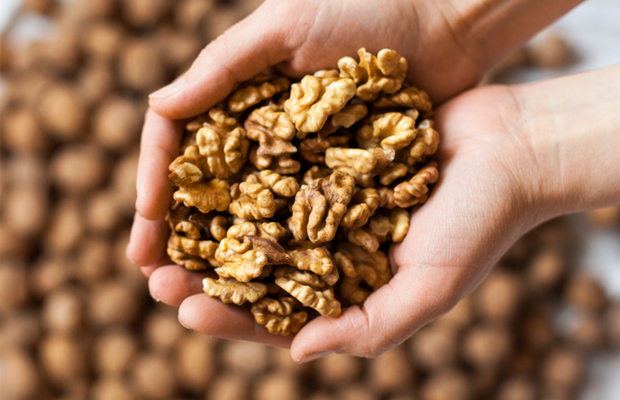
23. Put a daily ‘check-in’ on your calendar
Talking to your partner can help ward off the stresses of everyday life, says sex researcher and relationship therapist Dr Sarah Hunter Murray.
“When our romantic relationship is running smoothly, it acts as a buffer that helps weather the storm of other stresses we might be facing in our lives. But if we’re feeling stressed in our relationship, it’s going to have the opposite effect,” she explains.
“To help keep stress low in your relationship, the best thing to do is talk often and openly.”
So make time every day to check in with your partner. While you don’t want to bring up every gripe and grievance you have with her, your feelings can crop up in less healthy ways if they aren’t properly addressed, so it’s important to share the harder things that are bothering you, too.
Feeling your partner “jokingly” put you down in front of your friends or seeing her put work ahead of spending time with you can manifest as bad eating habits, drinking or zoning out in front of the TV instead of going to the gym, says Dr Murray.
But when you address your issues head on, you’ll feel lighter – and that reduced stress helps in all areas of your wellbeing.
24. Roll up your sleeves
Even if you’re a healthy guy, there’s one shot you need to get each year: the flu vaccine, says board-certified infectious disease specialist Dr Brent W Laartz, author of How to Avoid Contagious Diseases.
Thousands of deaths could prevented each year if everyone got the shot, he says. (If you’re over 65, have a chronic illness, or smoke, you want to get the pneumonia vaccine, too.)
And when you make your appointment for the flu shot, schedule it for the morning. Research from the University of Birmingham in the UK found that people had twice the number of flu antibodies – proteins that your body produces to fight off infection – after receiving the shot between 9am and 11am than those who got it between 3pm and 5pm did.
25. Stop pain fast
To protect against developing chronic pain, there are three things to keep in mind, says Dr Paul J Christo, an associate professor at Johns Hopkins Medicine and author of the upcoming book Aches and Gains: A Comprehensive Guide to Overcoming Your Pain.
First, don’t wait it out. If you’re in any kind of pain, see treatment fast. The more you wait, the more difficult it can be to treat. Secondly, reach out for help, whether it is a specialist or a support group. Finally, be open to traditional, integrative and innovative pain therapy options out there.
This article was originally featured on www.mh.co.za
Image credits: iStock

The Lung Cancer Symptoms You Need to Know, Even If You’ve Never Smoked
[brightcove:5166622966001 default]
Ashley Rivas was 26 when she noticed she was getting tired earlier than usual on her runs. Over the next few years, the X-ray technician from Albuquerque, New Mexico, developed a persistent cough and wheezing, which her doctors attributed to exercise-induced asthma. She had other symptoms, too: weight loss, fever, and several bouts of pneumonia. Still, when Rivas finally decided to perform a chest X-ray on herself, cancer was the last thing on her mind.
The image revealed a mass on her right lung that turned out to be a malignant tumor. Rivas was 32 and had never smoked a cigarette in her life. "I want people to know lung cancer can happen to anyone," she says.
Rivas has joined the American Lung Association's Lung Force campaign, to spread the word that her disease isn't just a smoker's affliction. "It's true that the majority of people with lung cancer have some history of tobacco use," says Lung Association spokesperson Andrea McKee, MD, the chair of radiation oncology at Lahey Hospital Medical Center in Burlington, Massachusetts. "Having said that, 15% of patients diagnosed with lung cancer have no history of tobacco use—and they may be quite young."
Other known risk factors aside from smoking include a family history of the disease, as well as exposure to certain air pollutants, such as asbestos, arsenic, radon, even diesel fumes, says Dr. McKee. Lung cancer is the most common cancer worldwide; and each year, it kills more women than breast, ovarian, and uterine cancer combined.
RELATED: 25 Breast Cancer Myths Busted
If it's diagnosed early, the disease is actually highly curable, Dr. McKee says. Luckily this was the case for Rivas. She had her tumor removed in 2013, and is now thriving. (She ran a half-marathon last year!)
But only about 16% of cases are caught at stage 1. "Usually it’s like a 7- to 8-millimeter nodule sitting in the middle of a lung that doesn’t have any symptoms associated with it," says Dr. McKee. Most patients are diagnosed later, once the tumor has grown large enough that it's "pushing on an airway, resulting in some breathing problems," she explains.
That's what Marlo Palacio experienced just before the holidays in 2013, when she developed a cough unlike any cough she'd ever had before. "I would feel like I was out of breath or gagging," she says. At first, the social worker from Pasadena, California, assumed she'd picked up a bug from her toddler son. But six weeks later, the cough hadn't gone away. Doctors diagnosed Palacio—an otherwise healthy, 39-year-old non-smoker—with stage 4 lung cancer.
At stage 4, lung symptoms like Palacio had (and others such as pneumonia and coughing up blood) may be accompanied by problems elsewhere in the body, such as back pain, bone pain, headaches, weight loss, and confusion, says Dr. McKee. That's because "once the disease has spread, [it's] usually having an effect on a system outside of the lungs," she explains.
After several different treatments, Palacio developed a new, isolated tumor in September. But she says she is doing well, physically and emotionally. "I'm feeling pretty positive that this will be something that we can just eliminate and maintain," she says. "I just accept that this is a lifelong fight for maintenance, and keeping my cancer down."
RELATED: 6 Cancer-Fighting Superfoods
Dr. McKee is hopeful that rising awareness of lung cancer, and advances in screening will mean fewer late-stage diagnoses in the future—because catching the disease early can make all the difference.
Frida Orozco knows that fact first-hand. She was diagnosed with stage 2 in her late twenties, a few months after she developed a dry cough. "I started to feel a pain every time I coughed on the lower side of my ribs, and also on the left side of my chest, near the clavicle," she says. When Orozco came down with a fever, headaches, and dizziness, she went to an urgent care facility; a chest X-ray revealed the mass in her lung.
But today, the 30-year-old student at Borough of Manhattan Community College happily reports she has been in remission for a year and a half. "You can't even tell I've been through all of this," she says, "except for the scars."
RELATED: 15 Thyroid Cancer Facts Everyone Should Know
So when should you get a lingering cough checked out? "To be safe, I would say that any cough that you're concerned about that's persisting beyond a few weeks, you should talk with your doctor," says Dr. McKee. "A cough shouldn't linger beyond two or three weeks."
If you suspect something is not right with your health, follow up, urges Rivas. "You know your body better than anybody," she says. "Push, because you're probably right. My pulmonologist told me that if I hadn’t caught [my cancer] when I did, I would’ve died. And it was because of my persistence. I knew something was wrong, I kept pushing."
To learn more lung cancer, check out the American Lung Association's Lung Force campaign.
Computational simulations suggest multiple sclerosis is a single disease
[unable to retrieve full-text content]

Health24.com | More evidence that depression shortens lives
People with depression tend to die earlier than expected – a pattern that has grown stronger among women in recent years, new research finds.
This is not a new finding – a previous Health 24 study also indicates that older people who suffer from depression may have a shorter life than those who don’t.
Both men and women affected
The study followed thousands of Canadian adults between 1952 and 2011. Overall, it found people with depression had a higher death rate versus those without the mood disorder.
The link only emerged among women starting in the 1990s. Yet by the end of the study, depression was affecting men’s and women’s longevity equally.
The findings do not prove that depression itself shaves years off people’s lives, said lead researcher Stephen Gilman.
The study could not account for the effects of physical health conditions, for example.
“So one explanation could be that people with depression were more likely to have a chronic condition,” said Gilman, of the US National Institute of Child Health and Human Development.
Link with physical health
But even if that were true, he added, it would not mean that depression bears no blame – because depression can take a toll on physical health.
“Many studies have found that people with depression have higher risks of heart disease and stroke, for example,” Gilman said.
The findings are based on 3 410 Canadian adults who were followed for up to several decades. The first wave of participants was interviewed in 1952, the next in 1970, and the final in 1992.
At each wave, roughly 6% of adults had depression, based on a standard evaluation.
And on average, those people had a shorter life span. For example, a 25-year-old man who was depressed in 1952 could expect to live another 39 years, on average. That compared with 51 years for a man without depression.
Men with depression at any point had a higher risk of dying over the coming years, versus those free of the disorder.
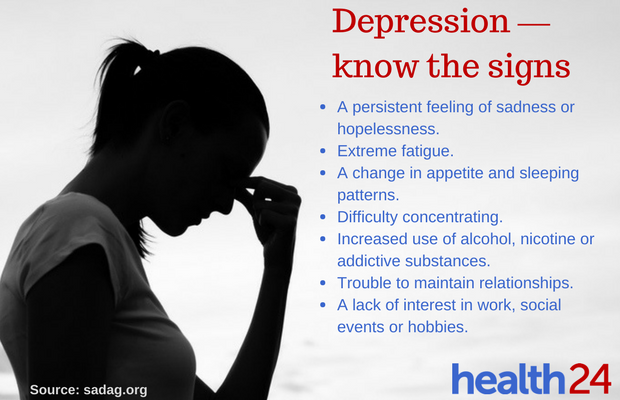
Outcome different for women
The picture was different for women, though. The connection between depression and mortality only surfaced in the 1990s.
Women with depression at that point were 51% more likely to die by 2011, compared with other women. That brought their risk on par with depressed men.
The reasons are unclear. “Why would depression be less toxic to women at one time point than another?” Gilman said.
He speculated that societal shifts have some role. Women in recent decades have been much more likely to juggle work and home life, or be single mothers, for example.
Another possibility, Gilman said, is that women tend to suffer more severe depression these days.
There was some evidence that the impact of depression lessened over time. Men with depression in 1952 no longer showed a higher death risk after 1968, for example – unless they also had depression at the later interviews, too.
Few suicides
As for causes of death, there was no evidence that suicides explained the risks among people with depression.
“There were actually few suicides,” Gilman said. “People with depression died of the same causes that other people did – like cardiovascular disease and cancer.”
Dr Aaron Pinkhasov is chairman of behavioural health at NYU Winthrop Hospital in Mineola, New York.
He said depression can indirectly shorten life span in a number of ways. Depressed people are less able to maintain a healthy lifestyle, and are more vulnerable to smoking and drinking. They may also be less equipped to manage any physical health conditions.
“Once depression sets in, you may not have the motivation or energy,” said Pinkhasov, who was not involved with the research.
Treatment can help
Gilman said his study can’t say whether treating depression erases the higher death risk associated with it.
But, Pinkhasov said, there is evidence that depression treatment can help people better control high blood pressure and diabetes, for example.
He stressed that there are various effective treatments – from “talk therapy” to medication.
Non-judgmental approach
“Don’t blame yourself for being ‘weak,’ or tell yourself you should just snap out of it,” Pinkhasov said.
John Hamilton, a counsellor at Mountainside Treatment Center in Canaan, Connecticut., agreed.
He said that women, in particular, can have a “sense of shame” over mental health symptoms in part because they feel they need to be the rock of the family. “They might even have people around them saying, ‘Snap out of it, you have kids,'” said Hamilton, who also had no role in the study.
“But depression is no different from any other chronic disease,” he said. “We need to have a compassionate, non-judgmental approach to it.”
Image credits: iStock
NEXT ON HEALTH24X

Blood test can effectively rule out breast cancer, regardless of breast density
[unable to retrieve full-text content]

Health24.com | Exactly what to do if you notice a lump in your breast
Three years ago, Sheeva Talebian felt an itch on her right chest. When she went to scratch it, she noticed something under her skin.
“It was like a round, circular pea,” she says of the lump in her breast. “I thought maybe it was a pimple because it was right at the top of my skin. So I ignored it and went to bed.”
Talebian, a doctor who is director of third party reproduction at the Colorado Center for Reproductive Medicine in New York City and is a co-founder of Truly-MD, had received a mammogram just six months prior. But she called her gynae anyway.
Her doctor said the small lump in her breast was probably nothing, and an ultrasound and second mammogram didn’t show anything concerning. But when she sought a second opinion, Talebian’s phone rang within 24 hours: “I dropped the phone and gasped,” she says.
“They told me I had invasive breast cancer.” The 6mm lump was tiny – small enough that Talebian herself had forgotten about it for a few months after she first noticed it – but her entire right breast had pre-cancer cells, and it had spread to surrounding tissue.
Read more: 5 cancer screening tests every woman should have
Fortunately, Talebian and her doctors caught her case early. She underwent a double mastectomy to remove the breast lump and surrounding tissue and was able to avoid chemotherapy treatment.
“I’m a doctor, but I have to be honest, I wasn’t doing a self-breast exam every month,” she admits. “I barely had any breast tissue, so in my head, I was like, ‘What am I even feeling?’ There was nothing really there.”
Now, of course, Talebian is adamant that women take control of their breast health. And turns out, that doesn’t necessarily mean monthly self-exams.
“We’ve always told women to do self-exams in the shower or lying down with one arm up, and to slowly and deliberately feel their way around the breast and nipple and into the armpit,” Talebian says. “But now there’s this new concept of breast awareness.”
That phrase about knowing something like the back of your hand? Today, gynaes are advocating that you know your breasts that well.
“Once you reach late adolescence or your early twenties, you should know what your breasts look and feel like,” Talebian says. “Know their size, shape, how they look in the mirror, how they feel, run your fingers across them occasionally – that way you know if anything suddenly feels different.”
Like Talebian, many women aren’t diligent about performing regular and frequent self-exams. So embracing breast awareness – particularly after ovulation but before your period – could be the key to noticing changes in your breast tissue.
Read more: 3 random things that can Totally mess with your mammogram results
So let’s say you feel something. Now what?
“Do something relatively quickly,” says Talebian. “You don’t need to page your doctor at midnight, but if you’re 100% certain what you’re feeling is new, call your gynaecologist, primary care physician or internist. Explain that you feel something that wasn’t there before and stay calm.”
The reason to act quickly isn’t necessarily that the case can worsen within 24 hours – it probably won’t – but so you don’t forget about it.
“If you put it out of your mind, eight months down the road it may be bigger and you’ll remember you never made that call,” Talebian says. “It’s never too early or too silly to bring your concern to a healthcare provider’s attention.”
Read more: This really simple image could actually help you detect breast cancer
And remember, the earlier you can catch potential signs of breast cancer, the better.
“Breast cancer is one of the very few cancers we do have screening tools for, and if it’s caught early, that can have a huge impact on your overall prognosis,” Talebian says. “Breast cancer can start as a small bump, and it may take several years before it metastasises and you start to experience pain or symptoms from it. So there are no excuses. Most often it’s nothing or it’s benign, but in the off chance it is cancerous, the earlier you deal with it, the sooner you can put it behind you forever. If you feel something, don’t ignore it.”
This article was originally published on www.womenshealthsa.co.za
Image credit: iStock

Health24.com | ‘Chemotherapy is scary but I got through it’
“It was during breast cancer awareness month, October 2016, when I found a lump in my breast,” Simòne Schultz says.
“An advert on TV reminded me that I had not done a self-examination in a while, and the minute I put my hand down I felt a lump.”
Simòne was in her third trimester of pregnancy.
“I wasn’t too worried. My gynae felt the same when I called the next day to let him know. A few weeks later he did a fine needle biopsy and three days later I got the call. It wasn’t good news… They had to deliver my baby a few days earlier and do another biopsy. It was not a death sentence.”
Seven days later, Simòne’s daughter, Kylie, was born. “She was absolutely perfect.”
Her stay in the maternity ward was half for baby, half for scans and tests.
“I was officially diagnosed in my hospital bed in the maternity ward and started chemotherapy when my daughter was three weeks old. It meant many nights away from her, but I accepted that I could not be everything she needed me to be at that time, and that getting better was my main priority.”
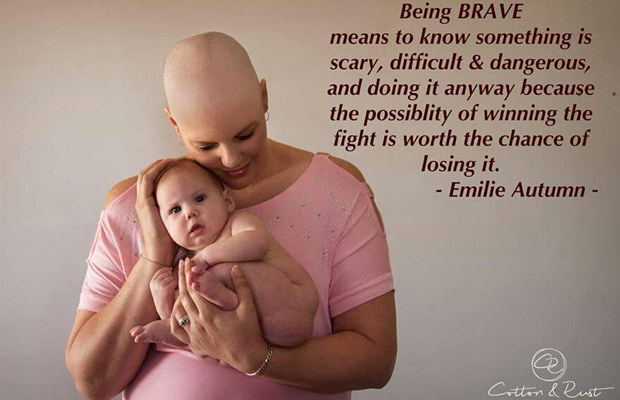
Simòne and her daughter Kylie during chemotherapy
Chemo is a scary word
“Chemotherapy is a very scary word but I got through it,” Simòne says. “The wonderful oncology nurses are angels and they guided me through my six months of treatment. I had a lumpectomy in June and have completed 33 radiation sessions. Yes, I get tired, I am tired!”
Cancer treatments combined with two children under the age of five is definitely not easy, she says, but somehow you find a way to make it work.
“My husband, family and friends have been absolutely amazing through this whole ordeal. People that I hardly knew were showing me their support, even strangers. I do allow myself to feel sad too – I cry, I get it all out and then I let it go.”
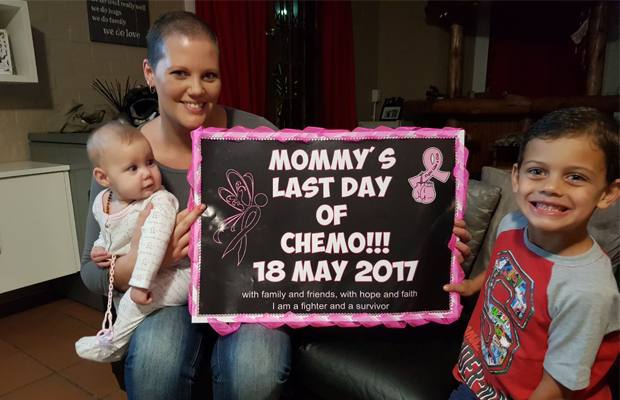
Simòne with her children, Kylie (who is turning one on 14 November 2017) and Cody (who turns five in February 2018).
Being a survivor
“I’m proud of myself for handling what I have gone through. I was the type of person that gets paranoid and thinks the worst of the slightest ache and pain. Now, dealing with cancer l realise I’m a lot stronger than I could ever have imagined. With God by my side, how could I not be?”
Simòne says she knows that she will always worry about things a little more now.
“I will have to have regular scans and check-ups; that’s all part of the parcel when going through cancer. But life is carrying on at the moment and I don’t think about cancer when I wake in the mornings. I am adjusting to my new life and embracing my new normal.”
Image credits: Supplied and Cotton & Rust

E-cigarettes: Cross-party group of MPs launches inquiry
They worry there are “significant gaps” in what we know about them and how they are regulated.
Typhoid vaccine set to have ‘huge impact’
Around 22 million people get typhoid fever each year and 220,000 die.




